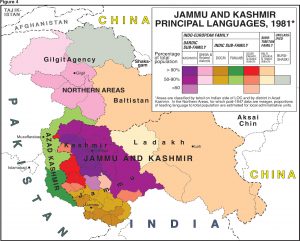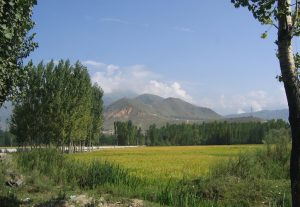Memo #319
By Promod Puri – promodpuri [at] blogspot.com
 The division of the Indian sub-continent in 1947 generated a persistent hostility between India and Pakistan, a hostility dominated by clashing territorial claims over the Kashmir region. On the international stage the Kashmir problem is largely viewed in diplomatic, political, government and media circles with the understanding that the region is a single entity—geographically, religiously, linguistically and culturally. However, in all these areas the unrecognized fact is that Kashmir is one of the most diverse regions of the Indian sub-continent. The Kashmir question should be approached with an understanding of these multi-faceted and divergent realities, rather than only as a religious or political problem.
The division of the Indian sub-continent in 1947 generated a persistent hostility between India and Pakistan, a hostility dominated by clashing territorial claims over the Kashmir region. On the international stage the Kashmir problem is largely viewed in diplomatic, political, government and media circles with the understanding that the region is a single entity—geographically, religiously, linguistically and culturally. However, in all these areas the unrecognized fact is that Kashmir is one of the most diverse regions of the Indian sub-continent. The Kashmir question should be approached with an understanding of these multi-faceted and divergent realities, rather than only as a religious or political problem.
The call of common identity through shared language and culture, recognized by post-modern social scientists as one of the basic human urges, is a strong motivating force in the political behavior of people the world over, and Kashmir is no exception. Jammu, Kashmir and Ladakh—the three administrative regions of Kashmir—are culturally, linguistically, religiously and even geographically distinct. Equally important and distinct is the non-Kashmiri speaking region of Azad Kashmir now under Pakistan control, and which was once part of the State of Jammu and Kashmir before 1947.
But such diversity is often overlooked and underplayed in the tug-of-war between Pakistan and India over the region. Pakistan views the Kashmir problem from only one aspect—that is the region’s Muslim majority. True, the demographic data confirms this empirical fact. But this should not be the sole argument for it being a part of Pakistan. India’s position is that Kashmir belongs to it because the autocratic ruler of the former Kashmir state signed an accession treaty with India. Meanwhile, the divergent urges of the region itself have been suppressed for too long. When these are released and recognized the Kashmir problem opens up beyond religion and politics. When this is considered, a referendum to decide the future of the state—whether it will be part of India, Pakistan, or remain independent—becomes the answer most inclusive of the region’s diversity, and critical if a permanent resolution to the Kashmir problem is to be found.
About the Author:
Promod Puri, a native of the state of Jammu Kashmir, is the former editor and publisher of the South Asian Canadian weekly, The Link. He is now retired and residing in Vancouver, Canada.

The Diverse Languages of the Kashmir region (credit: The Kashmir Study Group, kashmirstudygroup.com).
Links:
- Luv Puri, Across the Line of Control: Inside Pakistan-Administered Kashmir (Hurst Publishers, 2014)
- BBC News, “Kashmir Profile – Overview”
- Rekha Chowdhary, “Social Diversity, Political Divergence and Challenges for Conflict Resolution in J&K,” Lokniti – Programme for Comparative Democracy (October 2014)
- Shubh Mathur (Guest Editor), “Memory and Hope: New Perspectives on the Kashmir Problem,” Special Issue of Race & Class 56:2 (October 2014)

Comments are closed, but trackbacks and pingbacks are open.